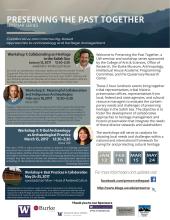"Preserving the Past Together," a seminar and workshop series sponsored by the University of Washington's College of Arts & Sciences, wǝɫǝbʔaltxʷ - Intellectual House Academic Planning Committee, Burke Museum of Natural History, and Quaternary Research Center. The event series will be hosting four workshops centered on Collaborative and Community-Based Approaches to Archaeology and Heritage Management in the Pacific Northwest.
These events will bring together tribal historic preservation offices, federal, state and local agency representatives, and cultural resource managers to discuss how we might further develop inclusive approaches to heritage management and historic preservation that work for and in accordance with specific values and cultural protocols of multiple stewards and stakeholders within the Pacific Northwest. The workshops will serve as catalysts for situating local needs and challenges within a national and international framework for caring for and protecting cultural heritage.
Our events include:
Workshop 1: Collaborating on Heritage in the Puget Sound
January 12th,2017 12:30-2:30 pm
wǝɫǝbʔaltxʷ – Intellectual House
Join us for our opening event, featuring an address by Chairman Leonard Forsman (Suquamish Tribe; Vice-Chair, Advisory Council on Historic Preservation) and a facilitated conversation with representatives from local tribes, WSDOT, DAHP and UW Law. Workshop panelists and attendees will consider the following question: What are the opportunities and challenges of caring for heritage within the Salish Sea?
Workshop 2: Meaningful Collaboration and Indigenous Archaeologies
February 16, 2017 12:30-2:30
Smith Room (324), Suzzallo Allen Library
Engaged, collaborative forms of archaeological practice that integrate the perspectives of multiple stewards and stakeholders are becoming a key feature of archaeological practice in the 21st Century. Through this workshop panelists and keynote speaker Dr. Chip Colwell discuss how tribal nations and heritage managers are working together to integrate indigenous values and knowledge into the care of tribal heritage. Dr. Chip Colwell will also provide public lecture (see below) on his new book, Plundered Skulls and Stolen Spirits: Inside the Fight to Reclaim Native America’s Culture.
Public Lecture: Let Us Rebury Our Dead: Native America’s Necessary and Imperfect Law
February 16, 2017 4:30-6:30
Allen Auditorium, Suzzallo Allen Library
This talk presents a new book, Plundered Skulls and Stolen Spirits: Inside the Fight to Reclaim Native America’s Culture, a personal journey that illuminates how repatriation has transformed both American museums and Native communities. This story reveals why repatriation law has become an imperfect but necessary tool to resolve the collision of worldviews between scientists and Native Americans—to decide the nature of the sacred and the destiny of souls.
Workshop 3: Tribal Archaeology as Archaeological Practice
March 15, 2017 12:30-2:30
Venue TBD
How does a THPO or tribal community develop an approach to archaeology and historic preservation that is rooted in the values of their nation and community? Dr. Ora Marek-Martinez (Navajo Nation, Northern Arizona University) will moderate a discussion with Washington and Oregon Tribal Historic Preservation Offices and Archaeology Departments, discussing the strategies they have used to articulate and implement sovereignty-based approaches to archaeology. Dr. Marek-Martinez will also provide public lecture on her work in Navajo Nation Archaeology Department.
Workshop 4: Best Practices in Collaboration
May 24-25, 2017
sgwәdzadad qәł ?altxw – House of Awakened Culture
All participants in the seminar series are invited to participate in an afternoon-long workshop on best practices in collaboration, to be held in conjunction with the annual Suquamish Tribal Heritage Summit at the House of Awakened Culture. The workshop will include local, national, and international examples of community-based research with tribal nations in the U.S. and Canada.
For up-to-date details go to the "Preserving the Past Together" website: http://blogs.uw.edu/preserve/
